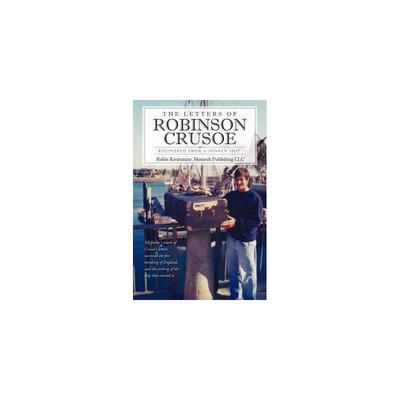Reading Robinson Crusoe
When I was still a young child, I used to likereading some adventurous stories, in which I think the qualities ofcourage, self-confidence and perseverance are shown. That's why Ilike Robinson Crusoe so much. As an emblem of human survival in alonely and hostile world, Robinson Crusoe is considered to be aheroic person by the people all over the world. The novel was basedon the true story of Alexander Selkirk, a sailor of Scotland. JamesS. Bruce and Mayme S. Bruce present us a summary account of theadventures of Alexander Selkirk: Alexander Selkirk was anadventurer at heart, unsuited to shoemaking and village life, andin 1695 ran away to sea. In September of 1704, after a quarrel withhis own Captain, the hotheaded Selkirk requested that he be putashore on the uninhabited island of Juan Fernandez, four hundredmiles west of Valparaiso, Chile. Selkirk remained there untilFebruary of 1709 when he was discovered by Captain Woodes Rogers inthe sailing ship "Duke" whose pilot happened to be Dampier.Inspired by the adventures of this sailor, Daniel Defoe succeededin creating the legendary Robinson Crusoe that gained him worldfame.
The author of this famous novel of adventure isDaniel Defoe, who is regarded as the first true English novelist inthe history of English literature. Born in 1660, Daniel Defoe had ahard life when he was still a young child whose father was a poorbut hard-working butcher. Because his father was a Dissenter,Daniel was deprived of the right of getting well educated in suchuniversities with good fame as Oxford and Cambridge. The youngDaniel dreamed to be a successful merchant. But it was proved notto be very easy and his business ended in insolvency. Defoe coulddo nothing but to pay off the debt by working hard. Although hisfather intended him for the ministry, Defoe plunged into politicsand trade, traveling extensively in Europe. He had worked for boththe Tories and the Whigs. In his own days Defoe was regarded as anunscrupulous, diabolical journalist. His political writings werewidely read and brought him powerful enemies, resulting in hisbeing put into prison. Some of his writings were focused on variouskinds of social problems. When he was fifty-nine years old, Defoebegan to write Robinson Crusoe, which was and is still thought tobe his best novel.
Robinson Crusoe is an inspiring novel ofadventure. In Bruce's words it is "the story of one man's faith,courage and ability to survive almost alone on an uninhabitedisland facing all of the forces of nature and to emerge triumphantover hardships and adversity".In the story, Defoe outlines, indiagrammatically simple terms, a hard-pastoral world of unremittingeffort and divine judgment. Defoe's novel describes the adventurousstory of an English sailor, Robinson Crusoe, marooned fortwenty-eight years on a deserted Caribbean island surviving by hiscourage, ingenuity and perseverance. He manages to get food,clothing, tools, guns and gunpowder and so on from the wreckedship. In order to survive, he learns to plant, to sew, and to cookand does things he has never done before. Robinson Crusoe alsosaves a savage whom he names Friday, and makes him his servant.With the assistance of Friday and other persons he has saved,Robinson Crusoe manages to leave the island and return to hishometown. Due to his survival on the island, Robinson Crusoe isregarded as "a symbol of man's ability to survive the ultimatetests of nature"
Through Defoe’s description of Robinson’ life onthe isolated island, we come to know that there are many merits inRobinson’s character that contributes to his successful escape fromthe island: ingenuity, hard working etc, especially the characterof the rising Bourgeois Class revealed by him notably known as thepioneering and exploring spirits and the practical spirit.
The image of Robinson reflects the sentiments andnature of the rising Bourgeois Class. Engels pointed out that he is"a true capitalist".As a successful artistic image, Robinson hashis own vivid personalities. In this chapter, I will prove mythesis point that Robinson is an embodiment of the rising BourgeoisClass by omparing Robinson’s characters with that of the risingBourgeois Class.
Robinson was portrayed in this social context.Robinson is a Bourgeoisie full of enterprising and adventurousspirits. In fact like his father, Robinson could happily live arelatively comfortable life of the middle Class without spendingmuch labor and taking any risks, just as his father said: “ a lifenot exposed to the Miseries and Hardships, the Labor and theSufferings of the mechanic part of Mankind, and not embarrassedwith Pride, Luxury, Ambition and Envy of the upper part of Mankind.And I might judge of the happiness of life by this one thing.”(Page3) However, unlike his conservative father whowas content with his lot without enterprising spirit, Robinson wasnot content to live the mediocre and unambitious life of the middleClass and looking forward to going abroad looking for adventures sothat he could open a new world and start his own enterprise.Propelled by an unrestrained enthusiasm, he was continuously takingactions and pursuing; Propelled by an unrestrained enthusiasm, heresolutely abandoned his easy and comfortable life arranged by hisfather and risked his life on the sea. Regardless of his father’sadmonishment, Robinson secretly left his family and adventured onthe sea to realize his dream. He went to London alone and then wentto Africa to do business and eventually arrived in Brazil tooperate a manor and became the manor owner. Still unsatisfied hewent back to Africa to traffic slaves. All the profitable placesattracted him like a magnet and made him rush forward despite therisks. Moreover, he had a series of plans to establish enterprisesand he went to many places to do business and to find profits andto explore new sources of raw materials and new markets. Robinsonbought a ship with his partners to explore new places but theyencountered a storm on the way and all the crew on the ship died inthe storm except him. Robinson was marooned to an isolated island,but he soon overcome his negative mood in spite of the adversesituations, fearlessly and not depressed, he began a battle toconquer the nature. During his 28 years on the island, he overcomeall the unexpected difficulties and revealed the rare fortitude andstrong mind. Even though the tools were simple and he wasinexperienced, even though his productions failed many times,Robinson never lost his heart and got discouraged, and whatever hedid, he never gave up before success. In short, all these thingsrevealed his enterprising, pioneering and adventurous spirits andportrayed the characters of the rising Bourgeois Class.
The adventurous spirit is also a very importantfactor in his survival. In such a desolated island withunpredictable threats, Robinson Crusoe's survival owes greatly tohis adventurous spirit and courage. On the island he is constantlyfacing the unknown and the unexpected, because it is a totallydifferent place from where he has lived with his family for nearlytwenty years. He is once in despair for the hard situation on theisland, and regrets how he rejects his father's wishes for him, "Hepressed me earnestly, and in the most affectionate manner, not toplay the young Man, not to precipitate my self into Miseries whichNature and the Station of Life I was born in, seemed to haveprovided against; that I was under no Necessity of seeking myBread; that he would do well for me, and endeavor to enter mefairly into the Station of Life which he had been just recommendingto me"(page 10). Though he regrets having betrayed his father'swill, he succeeds in overcoming the feeling of despair. He is awarethat his survival during the storm from the wrecked ship is luckyenough and he has nothing to complain. All he needs to do is toforget all the anxieties and start to struggle for his new life onthe island after the escape from the shipwreck. Robinson Crusoe isso brave in surmounting the difficulties, which sometimes threatenhis safety, even his life. His courage and confidence helps him toget to the wrecked ship in spite of the possibility of beingengulfed in the riptide. Later during his general exploration ofthe island, he walks freely on the island without fearing anythreat. For instance, Robinson Crusoe comes to realize that therainy Season is the most pernicious thing to his health, especiallyin the storms and hurricanes; he does not hesitate to go outlooking for food.
Robinson Crusoe's energetic aggressiveness ismore reflected in his fight with the savages and his determinationto overcome them, "I resolved, if possible, to get one of thosesavages into my hands, cost what I would"(page 196). And later whenhe succeeds in capturing Friday and other savages, he knows how tomanage them and becomes the master of the situation. Actually hisfight can be divided into three stages. Although he is frightenedat the first sight of the mysterious footprint, he gets everythingready for the possible attacks from the savages. Then he tries tosave Friday from being killed by other savages by shooting them andsuccessfully saves Friday and makes him his servant. From then on,and with Friday, Robinson Crusoe explores the new areas on theisland. Finally, he hates the killings between savages so much thathe makes up his mind to attack them after much mental struggle. Hetakes the initiative to stop the fight. His courage and energeticaggressiveness results in his actions and victory. The more severechallenge for Robinson Crusoe is to help the captain of a ship tosubdue the sailors who betray him and want to kill him on theisland. It requires not only powerful arms and outstandingingenuity, but also the unparalleled courage and bravery. Theenemies that Robinson Crusoe faces this time are different from thesavages; they are from the civilized society equipped with powerfularms. Robinson Crusoe and his men with the captain kill or imprisonthe rebel sailors. He encourages the captain by saying, "Men in ourCircumstances were past the Operation of Fear: That seeing almostevery Condition that could be, was better than that which we weresupposed to be in, we ought to expect that the Consequence, whetherDeath or Life, would be sure to be a Deliverance"(page 255). Theykill the cruel boatswain, who is supposed to be the biggestobstacle to rescue the ship. Finally they manage it. It is hisrescue of the captain that enables Robinson Crusoe to leave theisland.
As a representative of the rising Bourgeoisie,Robinson also has the hardworking spirits of this newly risingClass. Hardworking is generally regarded as one of the goodqualities of the human beings and a force, which plays an activerole in the evolutionary development of humankind. Robinson Crusoedevelops this very quality to overcome difficulty when living onthe island. In order to secure the safety of his house and keep himfrom the threats from the outside, Robinson Crusoe has to buildsome fences around his house by hands without any assistance oftools. Robinson Crusoe's hard working can be shown in the followingstatements: "I had never handled a tool in my life, and yet intime, by labor, application, and contrivance, I found at last thatI wanted nothing but I could have made it, especially if I had hadtools; however, I made abundance of things even without tools, andsome with no more tools than an adze and a hatchet, which perhapswere never made that way before, and that with infinite labor"(page 70). For Example, when Robinson Crusoe is making a board,without any convenient tools, the only thing he does is to put agreat deal of Time and Labor in flattening and smoothing it withthe crude tools. Sometimes I feel it hard to imagine how hardRobinson Crusoe works. In fact Robinson Crusoe himself is surprisedby his hard efforts in building his territory. Few men can overworklike Robinson. For instance, when he constructs his fence, he workshard all the time despite the hindrance of the rainy season. Itrains deep days; even weeks on end, but nothing can stop him fromworking on it until it is done. Hard work it is indeed, "I shouldnever be perfectly secure till this Wall was finished; and it isscarce credible what inexpressible Labor every Thing was done with,especially the bringing Piles out of the Woods, and driving theminto the Ground, for I made them much bigger than I need to havedone" (page 78). He spends 28 years making the island his home aswell as his territory. Among other things, he grows corn andbarley, herd goats, gathers wild fruits, hunts, and builds anelaborate fort. These eventually also provide necessary provisionsfor his long-distance sailing and make it possible for him todefeat the enemies and leave for England successfully. In fact inthe description of Robinson Crusoe's adventures, his preparationfor the escape is constantly shown. Defoe temptsus to believe that"the escape is easy, if one carefully prepares for it"
From Robinson Crusoe's confidence in himself andhis success on the island, we can also get this understanding.Likewise, Robinson Crusoe's individualism also plays a positiverole in his survival. During his stay on the island, he has to doeverything by himself. It results in his self-reliance. Thesituation changes a bit after he meets Friday, which provides anopportunity for Robinson Crusoe not so much to rely on him but tocommand others. As individualism urges him not to believe anybodyeasily, he does not allow Friday to sleep with him in the fort inorder to ensure his own safety. All the things Robinson Crusoe doeson the island serve his own interest and ensure his own safety. Hesaves Friday with the purpose of making him his servant so that hecan get a guide and possibly find a way out, as Humphreys pointsout: "Hedreams a premonitory dream of a rescued savage andprospects of freedom, and awakes dejectedly to isolation, butresolves to face whatever may come" What Robinson Crusoe thinks isclearly expressed in his own words: "I make this Conclusion, thatmy Only Way to go about an Attempt for an Escape, was, if possible,to get a Savage into my Possession"(page195). At the same time,there is no doubt that without hesitation he will kill any savagewho might be a threat for his peaceful life on the island. Thereason why he helps the captain to subdue the rebellious sailors isvery obvious. The captain will be the only man who can provide theopportunity for Robinson Crusoe's leaving the island if Robinsonhelps him to recapture the ship. Robinson Crusoe's individualism ismore reflected in this incident. In order to make the captain keephis promise, two conditions are required by Robinson Crusoe, "1.That while you stay on this Island with me, you will not pretend toany Authority here; and if I put Arms into your Hands, you willupon all Occasions give them up to me, and do no Prejudice to me ormine, upon this Island, and in the mean time be governed by myOrders; 2. That if the Ship is, or may be recovered, you will carryme and my Man to England Passage free" (page 250). Robinson Crusoeknows that these conditions will ensure his successful escape fromthe island, and they eventually do.
ReadingRobinsonCrusoe robinson crusoe pdf
更多阅读

pdf转换器怎么用 pdf转换成word
? 很多pdf转换成word转换器在实现pdf和word两者之间的转换的时候,对于pdf文件之内的图片、文字样式、超链接等一系列的内容的识别能力都并不完美。一般来说,转换能力较差的转换器软件转换之后,在word文件之内经常会出现各种排版上

PDF如何在线阅读 pdf在线阅读
PDF如何在线阅读——简介有时候电脑没有安装pdf软件那么就没法打开了,在线阅读的有好多英文的比较麻烦,接下来给大家讲一个简单的方法就是用网盘阅读,如百度网盘、360网盘,还有126邮箱都可以,接下来我们进入百度网盘PDF如何在线阅读——

怎样把PDF图片上加水印章 pdf水印 jpg图片无效
怎样把PDF图片上加水印章——简介工作中很需要的一个技能,需要盖章碰巧没有客户又急着要就就很麻烦啦。要做成仿真的章,一定要透明处理的这次用一下PS工具,初学者也不用担心,方法简单包教会怎样把PDF图片上加水印章——工具/原料一个

怎样用word2013编辑pdf文件 word编辑pdf文件
怎样用word2013编辑pdf文件——简介一般来说,pdf是不容易编辑的,很多软件都只提供pdf文件的浏览操作,但是想编辑pdf文件,又不想下载其他软件,或者是没时间精力学习pdf编辑软件,有什么捷径呢?有,就是直接利用word来编辑pdf文件,详见下面图文

pdf文件怎么打开 pdf用什么软件打开 pdf用什么软件打开
?pdf是一种非常常用的电子文件格式,许多电子文档及电子书都使用pdf格式,并显示出了非常好的阅读效果。那么,pdf文件怎么打开呢?打开pdf文件的软件又有哪些呢????? 我们可以使用金山卫士“软件管理”功能方便地选择下载各种打开pdf文件
 爱华网
爱华网